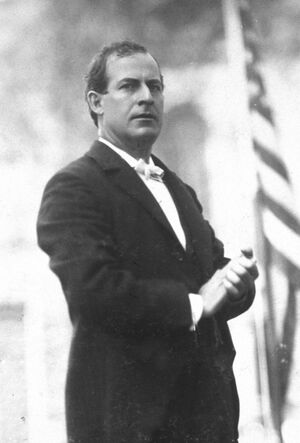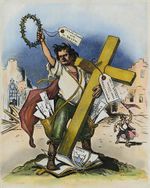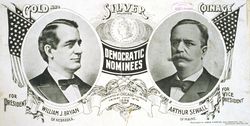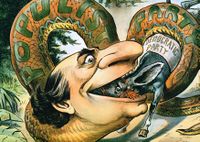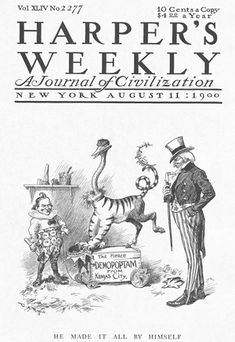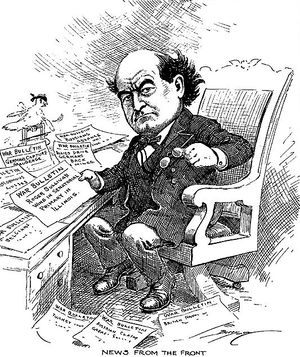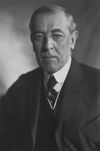وليام جننغز براين
وليام جننگز براين | |
|---|---|
William Jennings Bryan | |
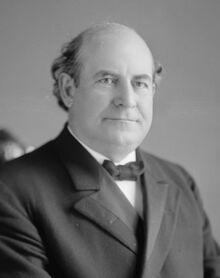 براين، حوالي ع1910 | |
| وزير الخارجية الأمريكي رقم 41 | |
| في المنصب 5 مارس 1913 – 9 يونيو 1915 | |
| الرئيس | وودرو ولسون |
| سبقه | فيلاندر نوكس |
| خلـَفه | روبرت لانسنگ |
| عضو of the U.S. مجلس النواب عن نبراسكا's 1st district | |
| في المنصب 4 مارس 1891 – 3 مارس 1895 | |
| سبقه | وليام جيمس كونل |
| خلـَفه | جسي بر سترود |
| تفاصيل شخصية | |
| وُلِد | مارس 19, 1860 سالم، إلينوي[1] |
| توفي | يوليو 26, 1925 (aged 65) دايتون، تنسي |
| المثوى | Arlington National Cemetery |
| الحزب | الديمقراطي |
| الزوج | ماري بيرد براين |
| الأنجال | روث براين أوِن، وليام جننگز براين، الابن، گريس براين |
| الأب | سايلاس براين |
| الأقارب |
|
| المدرسة الأم | كلية إلينوي، كلية يونيون للحقوق |
| المهنة | سياسي ومحامي |
| التوقيع | |
يقرأ خطبة صليب الذهب. تسجيل أصلي للخطبة قد يكون موجوداً. سـُجـّل 1921 | |
وليام جننگز براين (William Jennings Bryan ؛ 19 مارس 1860 - 26 يوليو 1925) خطيب وسياسي أمريكي من نبراسكا. تولى منصب وزير خارجية الولايات المتحدة من 5 مارس 1913 إلى 9 يونيو 1915 في عهد الرئيس وودرو ولسون.
ولد بريان في ولاية إلينوي، وانتقل إلى ولاية نبراسكا في ثمانينيات القرن التاسع عشر. وفاز بانتخابات مجلس النواب الأمريكي في انتخابات عام 1890، وخدم لفترتين قبل هزيمته في انتخابات مجلس الشيوخ عام 1894. وألقى بريان في المؤتمر الوطني الديمقراطي لعام 1896 خطابه "الصليب الذهبي" الذي هاجم فيه معيار الذهب والمصالح الشرقية. تنصل الحزب الديمقراطي من الرئيس الحالي وقتها جروفر كليڤلاند وزملائه من ديمقراطيي البوربون المحافظين، ورشح بريان للرئاسة، ليكون بريان أصغر مرشح رئاسي لحزب رئيسي في تاريخ الولايات المتحدة، وكان وقتها بعمر السادسة والثلاثين. وكان براين مؤيدا لنظام المعدنين Bimetallism (بمعيار الفضة والذهب معا) وتم ترشيحه أيضا من قبل الحزب الشعبوي والحزب الجمهوري الفضي. هزم بريان أمام الجمهوري ويليام ماكينلي في انتخابات عام 1896 بنتيجة متقاربة. ألقى برايان أكثر من 500 خطبة في عام 1896، فابتكر بهذا الحملة بالخطابات في عصر بقي فيه المرشحون الرئاسيون الآخرون في منازلهم.
بقي بريان مسيطرا على الحزب الديمقراطي ونال الترشيح الرئاسي مرة أخرى في عام 1900. أصبح بريان معارضا شرسا للإمبريالية الأمريكية في أعقاب الحرب الإسبانية الأمريكية، وسخر جزءا كبيرا من حملته على هذه القضية. هزم بريان أمام ماكينلي مرة أخرى، وانتصر الأخير في عدد من الولايات الغربية التي فاز بها بريان في الانتخابات السابقة. ضعف نفوذ بريان في الحزب بعد هذه الانتخابات، ورشح الديمقراطيون بدلا منه المحافظ ألتون باركر في الانتخابات الرئاسية عام 1904. فاز بريان بترشيح حزبه في الانتخابات الرئاسية عام 1908، ولكنه هزم أمام وليام هوارد تافت.
بعد أن فاز الديمقراطيون بالرئاسة في انتخابات عام 1912، قام ويلسون بمكافأة دعم بريان له بأن وضعه في منصب هام هو وزير الخارجية. بعد أن نسفت سفينة لوسيتانيا من قبل سفينة ألمانية في عام 1915، قدم ويلسون مجموعة مطالب قوية على ألمانيا لم يتفق معها بريان، حيث كان ويلسون يأمل في تجنب دخول الحرب العالمية الأولى. استقال بريان من منصبه في عام 1915، ودخلت الولايات المتحدة الحرب بعد ذلك بعامين. ظل بريان نشطا في الحياة العامة، ودعم إعادة انتخاب ويلسون ومنع الكحول. عارض بريان الداروينية على أسس دينية وإنسانية، وأظهر آراءه في محاكمة سكوبس (أو محاكمة القرد) ي ولاية تينيسي عام 1925. كما أصبح مروج عقارات في فلوريدا، وساهم في ازدهار سوق الأراضي في فلوريدا عقد 1920. توفي بريان في نومه بعد خمسة أيام من انتهاء قضية سكوبس التي فاز بها.
. . . . . . . . . . . . . . . . . . . . . . . . . . . . . . . . . . . . . . . . . . . . . . . . . . . . . . . . . . . . . . . . . . . . . . . . . . . . . . . . . . . . . . . . . . . . . . . . . . . . . . . . . . . . . . . . . . . . . . . . . . . . . . . . . . . . . . . . . . . . . . . . . . . . . . . . . . . . . . . . . . . . . . . .
مرشح رئاسي وزعيم الحزب
الانتخابات الرئاسية 1896
الترشيح الديمقراطي
ترشح لانتخابات الرئاسة الأمريكية ثلاث مرات في أعوام 1896، و1900، و1908.
By 1896, free silver forces were ascendant within the party. Though many Democratic leaders were not as enthusiastic about free silver as Bryan was, most recognized the need to distance the party from the unpopular policies of the Cleveland administration. By the start of the 1896 Democratic National Convention, Representative Richard P. Bland, a long-time champion of free silver, was widely perceived to be the frontrunner for the party's presidential nomination. Bryan hoped to offer himself as a presidential candidate, but his youth and relative inexperience gave him a lower profile than veteran Democrats like Bland, Governor Horace Boies of Iowa, and Vice President Adlai Stevenson. The free silver forces quickly established dominance over the convention, and Bryan helped draft a party platform that repudiated Cleveland, attacked the conservative rulings of the Supreme Court, and called the gold standard "not only un-American but anti-American".[3]
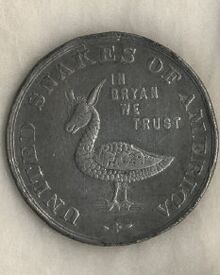
Conservative Democrats demanded a debate on the party platform, and on the third day of the convention, each side put forth speakers to debate free silver and the gold standard. Bryan and Senator Benjamin Tillman of South Carolina were chosen as the speakers who would advocate for free silver, but Tillman's speech was poorly received by delegates from outside the South because of its sectionalism and references to the Civil War. Charged with delivering the convention's last speech on the topic of monetary policy, Bryan seized his opportunity to emerge as the nation's leading Democrat. In his "Cross of Gold" speech, Bryan argued that the debate over monetary policy was part of a broader struggle for democracy, political independence and the welfare of the "common man". Bryan's speech was met with rapturous applause and a celebration on the floor of the convention that lasted for over half an hour.[4]
The following day, the Democratic Party held its presidential ballot. With the continuing support of Governor John Altgeld of Illinois, Bland led the first ballot of the convention, but he fell far short of the necessary two-thirds vote. Bryan finished in a distant second on the convention's first ballot, but his Cross of Gold speech had left a strong impression on many delegates. Despite the distrust of party leaders like Altgeld, who was wary of supporting an untested candidate, Bryan's strength grew over the next four ballots. He gained the lead on the fourth ballot and won his party's presidential nomination on the fifth ballot.[5] At the age of 36, Bryan became and still remains the youngest presidential nominee of a major party in American history.[6] The convention nominated Arthur Sewall, a wealthy Maine shipbuilder who also favored free silver and the income tax, as Bryan's running mate.[5]
- في المرة الأولى عام 1896 ضد المرشح الجمهوري ويليام مكينلي، وكانت نتيجة الانتخابات فوز ماكنلي برئاسة الولايات المتحدة. كان بريان يبلغ من العمر 36 سنة، أكبر بسنة واحدة فقط مما يتطلبه الدستور الأمريكي للترشح للرئاسة، ولو فاز بالرئاسة لصار أصغر من تولى رئاسة الولايات المتحدة حتى اليوم.
الحرب والسلام: 1898–1900
الحرب الأمريكية-الإسپانية
Because of better economic conditions for farmers and the effects of the Klondike Gold Rush in raising prices, free silver lost its potency as an electoral issue in the years after 1896. In 1900, President McKinley signed the Gold Standard Act, which put the United States on the gold standard. Bryan remained popular in the Democratic Party and his supporters took control of party organizations throughout the country, but he initially resisted shifting his political focus from free silver.[7] Foreign policy emerged as an important issue due to the ongoing Cuban War of Independence against Spain, as Bryan and many Americans supported Cuban independence. After the explosion of the USS Maine in Havana Harbor, the United States declared war on Spain in April 1898, which began the Spanish–American War. Though wary of militarism, Bryan had long favored Cuban independence and so supported the war.[8] He argued that "universal peace cannot come until justice is enthroned throughout the world. Until the right has triumphed in every land and love reigns in every heart, government must, as a last resort, appeal to force".[9]
At Governor Silas A. Holcomb's request, Bryan recruited a 2000-man regiment for the Nebraska National Guard and the soldiers of the regiment elected Bryan as their leader. Under Colonel Bryan's command, the regiment was transported to Camp Cuba Libre in Florida, but the fighting between Spain and the United States ended before the regiment had been deployed to Cuba. Bryan's regiment remained in Florida for months after the end of the war, which prevented Bryan from taking an active role in the 1898 midterm elections. Bryan resigned his commission and left Florida in December 1898 after the United States and Spain had signed the Treaty of Paris.[8]
Bryan had supported the war to gain Cuba's independence, but he was outraged that the Treaty of Paris granted the United States control over the Philippines. Many Republicans believed that the United States had an obligation to "civilize" the Philippines, but Bryan strongly opposed what he saw as American imperialism. Despite his opposition to the annexation of the Philippines, Bryan urged his supporters to ratify the Treaty of Paris. He wanted to quickly bring an official end to the war and then to grant independence to the Philippines as soon as possible. With Bryan's support, the treaty was ratified in a close vote, bringing an official end to the Spanish–American War. In early 1899, the Philippine–American War broke out as the established Philippine government, under the leadership of Emilio Aguinaldo, sought to stop the American invasion of the archipelago.
الانتخابات الرئاسية 1900
- أما الثانية عام 1900 ترشح ضد الرئيس ماكنلي وخسر الانتخابات أيضاً.
- أما الثالثة عام 1908 فكانت ضد المرشح الجمهوري وليام هوارد تافت، لكن بريان خسر الانتخابات أيضاً، وفاز تافت برئاسة الولايات المتحدة.
. . . . . . . . . . . . . . . . . . . . . . . . . . . . . . . . . . . . . . . . . . . . . . . . . . . . . . . . . . . . . . . . . . . . . . . . . . . . . . . . . . . . . . . . . . . . . . . . . . . . . . . . . . . . . . . . . . . . . . . . . . . . . . . . . . . . . . . . . . . . . . . . . . . . . . . . . . . . . . . . . . . . . . . .
بين الحملتين الرئاسيتين، 1901–1907

After the election, Bryan returned to journalism and oratory and frequently appeared on the Chautauqua circuits to give well-attended lectures across the country.[11] In January 1901, Bryan published the first issue of his weekly newspaper, The Commoner, which echoed his favorite political and religious themes. Bryan served as the editor and publisher of the newspaper; Charles Bryan, Mary Bryan and Richard Metcalfe also performed editorial duties when Bryan was traveling. The Commoner became one of the most widely-read newspapers of its era and boasted 145,000 subscribers approximately five years after its founding. Though the paper's subscriber base heavily overlapped with Bryan's political base in the Midwest, content from the papers was frequently reprinted by major newspapers in the Northeast. In 1902, Bryan, his wife and his three children moved into Fairview, a mansion located in Lincoln; Bryan referred to the house as the "Monticello of the West", and frequently invited politicians and diplomats to visit.[12]
Bryan's defeat in 1900 cost him his status as the clear leader of the Democratic Party and conservatives such as David B. Hill and Arthur Pue Gorman moved to re-establish their control over the party and return it to the policies of the Cleveland era. Meanwhile, Roosevelt succeeded McKinley as president after the latter's assassination in September 1901. Roosevelt prosecuted antitrust cases and implemented other progressive policies, but Bryan argued that Roosevelt did not fully embrace progressive causes. Bryan called for a package of reforms, including a federal income tax, pure food and drug laws, a ban on corporate financing of campaigns, a constitutional amendment providing for the direct election of senators, local ownership of utilities, and the state adoption of the initiative and the referendum,[13] and provisions for old age.[14] He also criticized Roosevelt's foreign policy and attacked Roosevelt's decision to invite Booker T. Washington to dine at the White House in 1901.[15]
Prior to the 1904 Democratic National Convention, Alton B. Parker, a New York and conservative ally of David Hill, was the frontrunner for the Democratic presidential nomination. Conservatives feared that Bryan would join with the publisher William Randolph Hearst to block Parker's nomination. Seeking to appease Bryan and other progressives, Hill agreed to a party platform that omitted mention of the gold standard and criticized trusts.[16] In the event, Bryan did not support Parker or Hearst, but rather Francis Cockrell, a Missouri senator whose career had been almost wholly unremarkable.[17] Bryan's motivation was not any belief that Cockrell could defeat Roosevelt in the election, but rather that he would lose decisively, thus paving the way for Bryan to be re-nominated in 1908. However, the possibility of Hearst getting the nomination alarmed the party's moderates enough that they moved to support Parker, who was narrowly nominated on the first ballot at the convention, with Cockrell finishing a distant third place.[18] Bryan would nonetheless get his desired outcome when Roosevelt won by the biggest popular vote margin since James Monroe was re-elected without opposition in 1820. Afterwards, Bryan published a post-election edition of The Commoner that advised its readers: "Do not Compromise with Plutocracy".[19]
Bryan traveled to Europe in 1903, meeting with figures such as Leo Tolstoy, who shared some of Bryan's religious and political views.[20] In 1905, Bryan and his family embarked on a trip around the globe and visited eighteen countries in Asia and Europe. Bryan funded the trip with public speaking fees and a travelogue that was published on a weekly basis.[21] Bryan's travels abroad were documented in a study called "The Old World and its Ways", in which he shared his thoughts on different topics such as those related to progressive politics and labor legislation. Bryan was greeted by a large crowd upon his return to the United States in 1906 and was widely seen as the likely 1908 Democratic presidential nominee. Partly due to the efforts of muckraking journalists, voters had become increasingly open to progressive ideas since 1904. President Roosevelt himself had moved to the left, favoring federal regulation of railroad rates and meatpacking plants.[22] However, Bryan continued to favor more far-reaching reforms, including federal regulation of banks and securities, protections for union organizers and federal spending on highway construction and education. Bryan also briefly expressed support for the state and federal ownership of railroads in a manner similar to Germany but backed down from that policy in the face of an intra-party backlash.[23]
رئاسة ولسون
انتخابات 1912

وزيراً للخارجية: 1913–1915
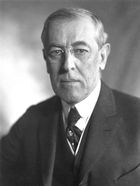
President Wilson named Bryan as Secretary of State, the most prestigious appointive position. Bryan's extensive travels, popularity in the party, and support for Wilson in the election made him the obvious choice. Bryan took charge of a State Department that employed 150 officials in Washington and an additional 400 employees in embassies abroad. Early in Wilson's tenure, the president and the secretary of state broadly agreed on foreign policy goals, including the rejection of Taft's Dollar diplomacy.[24] They also shared many priorities in domestic affairs and, with Bryan's help, Wilson orchestrated passage of laws that reduced tariff rates, imposed a progressive income tax, introduced new antitrust measures, and established the Federal Reserve System. Bryan proved particularly influential in ensuring that the president, rather than private bankers, was empowered to appoint the members of the Federal Reserve Board of Governors.[25]
Secretary of State Bryan pursued a series of bilateral treaties that required both signatories to submit all disputes to an investigative tribunal. He quickly won approval from the president and the Senate to proceed with his initiative. In mid-1913, El Salvador became the first nation to sign one of Bryan's treaties, and 29 other countries, including every great power in Europe other than Germany and Austria-Hungary, also agreed to sign the treaties.[26] Despite Bryan's stated aversion to conflict, he oversaw U.S. interventions in Haiti, the Dominican Republic and Mexico.[27]
After World War I broke out in Europe, Bryan consistently advocated for American neutrality between the Entente and the Central Powers. With Bryan's support, Wilson initially sought to stay out of the conflict, urging Americans to be "impartial in thought as well as action".[28] For much of 1914, Bryan attempted to bring a negotiated end to the war, but the leaders of both the Entente and the Central Powers were ultimately uninterested in American mediation. Bryan remained firmly committed to neutrality, but Wilson and others within the administration became increasingly sympathetic to the Entente.
The March 1915 Thrasher incident, in which a German U-boat sank a British passenger ship with an American citizen on board, provided a major blow to the cause of American neutrality. The May 1915 sinking of RMS Lusitania by another German U-boat further galvanized anti-German sentiment, as 128 Americans died in the incident. Bryan argued that the British blockade of Germany was as offensive as the German U-boat Campaign.[29] He also maintained that by traveling on British vessels, "an American citizen can, by putting his own business above his regard for this country, assume for his own advantage unnecessary risks and thus involve his country in international complications".[30] After Wilson sent an official message of protest to Germany and refused to warn Americans publicly not to travel on British ships, Bryan delivered his letter of resignation to Wilson on June 8, 1915.[31]
عمله اللاحق
الانخراط السياسي
. . . . . . . . . . . . . . . . . . . . . . . . . . . . . . . . . . . . . . . . . . . . . . . . . . . . . . . . . . . . . . . . . . . . . . . . . . . . . . . . . . . . . . . . . . . . . . . . . . . . . . . . . . . . . . . . . . . . . . . . . . . . . . . . . . . . . . . . . . . . . . . . . . . . . . . . . . . . . . . . . . . . . . . .
الترويج العقاري لفلوريدا
Trustee of American University
Bryan served as a member of the Board of Trustees at American University in Washington, D.C., from 1914 to his death.[32] For some of these years, he served concurrently with Warren G. Harding and Theodore Roosevelt.
محاربة نظرية التطور: 1918–1925
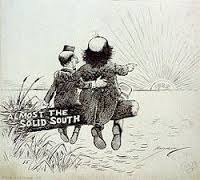
كارتون من نوفمبر 1924 يصوّر براين مع شقيقه، تشارلز، جالسين على جذع شجرة مكتوب عليه "الجنوب الصلب تقريباً" وينظران إلى الشمس المكتوب عليها "1928" حيث يحدوهم المزيد من الأمل. فقد كان تشارلز المرشح الديمقراطي الخاسر لمنصب نائب الرئيس في 1924.
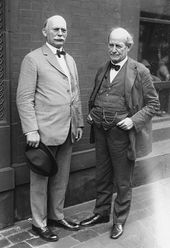
In the 1920s, Bryan shifted his focus away from politics, becoming one of the most prominent religious figures in the country.[33] He held a weekly Bible class in Miami and published several religiously-themed books.[34] He was one of the first individuals to preach religious faith on the radio, which let him reach audiences across the country.[35] Bryan welcomed the proliferation of faiths other than Protestant Christianity, but he was deeply concerned by the rejection of Biblical literalism by many Protestants.[36] According to the historian Ronald L. Numbers, Bryan was not nearly as much a fundamentalist as many modern-day creationists of the 21st century. Instead, he is more accurately described as a "day-age creationist".[37] Bradley J. Longfield posits Bryan was a "theologically conservative Social Gospeler".[38]
In the final years of his life, Bryan became the unofficial leader of a movement that sought to prevent public schools from teaching Charles Darwin's theory of evolution.[33] Bryan had long expressed skepticism and concern regarding Darwin's theory; in his famous 1909 Chautauqua lecture, "The Prince of Peace", Bryan had warned that the theory of evolution could undermine the foundations of morality.[39] Bryan opposed Darwin's theory of evolution through natural selection for two reasons. He believed what he considered a materialistic account of the descent of man (and all life) through evolution to be directly contrary to the Biblical creation account. Also, he considered Darwinism as applied to society (social Darwinism) to be a great evil force in the world by promoting hatred and conflicts and inhibiting upward social and economic mobility of the poor and oppressed.[40]
As part of his crusade against Darwinism, Bryan called for state and local laws banning public schools from teaching evolution.[41] He requested that lawmakers refrain from attaching a criminal penalty to the anti-evolution laws and also urged that educators be allowed to teach evolution as a "hypothesis", rather than as a fact. Only five southern states responded to Bryan's call to bar the teaching of evolution in public schools.[42]
Bryan was worried that the theory of evolution was gaining ground not only in the universities, but also within the church. The developments of 19th century liberal theology, specifically higher criticism, had allowed many clergymen to be willing to embrace the theory of evolution and claim that it was not contradictory to Christianity. Determined to put an end to this, Bryan, who had long served as a Presbyterian elder, decided to run for the position of Moderator of the General Assembly of the Presbyterian Church in the United States of America, which was at the time embroiled in the Fundamentalist–Modernist Controversy. Bryan's main competition in the race was the Rev. Charles F. Wishart, president of the College of Wooster in Ohio, who had loudly endorsed the teaching of the theory of evolution in the college. Bryan lost to Wishart by a vote of 451–427. Bryan failed in gaining approval for a proposal to cut off funds to schools in which the theory of evolution was taught.
محاكمة سكوپس: 1925
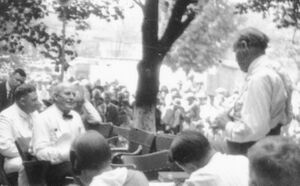
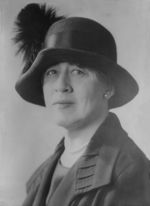
From July 10 to 21, 1925, Bryan participated in the highly-publicized Scopes Trial. The defendant, John T. Scopes, had violated the Butler Act, a Tennessee law barring the teaching of evolution in public schools, while serving as a substitute biology teacher in Dayton, Tennessee. His defense was funded by the American Civil Liberties Union and led in court by the famed lawyer Clarence Darrow. No one disputed that Scopes had violated the Butler Act, but Darrow argued that the statute violated the Establishment Clause of the First Amendment. Bryan defended the right of parents to choose what schools teach, argued that Darwinism was merely a "hypothesis", and claimed that Darrow and other intellectuals were trying to invalidate "every moral standard that the Bible gives us".[43] The defense called Bryan as a witness and asked him about his belief in the literal word of the Bible, though the judge later expunged Bryan's testimony.[44]
Ultimately, the judge instructed the jury to render a verdict of guilty, and Scopes was fined $100 for violating the Butler Act.[45] The national media reported the trial in great detail, with H. L. Mencken ridiculing Bryan as a symbol of Southern ignorance and anti-intellectualism.[46] Even many Southern newspapers criticized Bryan's performance in the trial; the Memphis Commercial Appeal reported that "Darrow succeeded in showing that Bryan knows little about the science of the world". Bryan had been prevented from delivering a final argument at trial, but he arranged for the publication of the speech he had intended to give. In that publication, Bryan wrote that "science is a magnificent material force, but it is not a teacher of morals".[47]
خمّن عالم الأحياء ستيفن جاي گولد أن آراء براين المضادة للتطور كانت نتيجة مثاليته الشعبوية واقترح أن محاربة براين لنظرية التطور هي في الحقيقة حرب ضد علم تحسين النسل.
انظر أيضاً
الهامش
- ^ William Jennings Bryan Nebraska State Historical Society
- ^ خطأ استشهاد: وسم
<ref>غير صحيح؛ لا نص تم توفيره للمراجع المسماةFT - ^ Kazin (2006), pp. 53–55, 58
- ^ Kazin (2006), pp. 56–62
- ^ أ ب Kazin (2006), pp. 62–63
- ^ Glass, Andrew (March 19, 2012). "William Jennings Bryan born, March 19, 1860". Politico. Retrieved August 3, 2018.
- ^ Kazin (2006), pp. 83–86
- ^ أ ب Kazin (2006), pp. 86–89
- ^ Sicius (2015), p. 182
- ^ source Joseph Keppler in Puck (magazine) Sept 19, 1906; reprinted in: Smylie, James H. "William Jennings Bryan and the Cartoonists: A Pictorial Lampoon, 1896—1925". Journal of Presbyterian History 53.2 (1975): 83–92 at p 88 online.
- ^ Kazin (2006), p. 122
- ^ Kazin (2006), pp. 111–113
- ^ Kazin (2006), pp. 113–114
- ^ William Jennings Bryan Volume 1 By Paolo Enrico Coletta, 1964, P.441
- ^ Kazin (2006), p. 114
- ^ Kazin (2006), pp. 114–116
- ^ "HarpWeek | Elections | 1904 Large Cartoons". elections.harpweek.com.
- ^ Kennedy, Robert C. "Citizen Parker". The New York Times. Retrieved 8 October 2015.
- ^ Kazin (2006), pp. 119–120
- ^ Kazin (2006), pp. 126–128
- ^ Kazin (2006), pp. 121–122
- ^ Kazin (2006), pp. 142–143
- ^ Kazin (2006), pp. 145–149
- ^ Kazin (2006), pp. 215–217, 222–223
- ^ Kazin (2006), pp. 223–227
- ^ Kazin (2006), pp. 217–218
- ^ Kazin (2006), pp. 229–231
- ^ Kazin (2006), pp. 232–233
- ^ Kazin (2006), pp. 234–236
- ^ Levine (1987), p. 8
- ^ Kazin (2006), pp. 237–238
- ^ American University website
- ^ أ ب Kazin (2006), pp. 262–263
- ^ Florida Memory. "William Jennings Bryan Conducting a Bible Class in Royal Palm Park – Miami, Florida". Retrieved August 17, 2018.
- ^ Kazin (2006), pp. 271–272
- ^ Kazin (2006), pp. 272–273
- ^ Ronald L. Numbers, The Creationists: From Scientific Creationism to Intelligent Design, (2006), p. 13
- ^ Longfield, Bradley J. (1993). The Presbyterian Controversy. Oxford University Press. ISBN 978-0-19-508674-4. Retrieved August 17, 2018.
- ^ See The Prince of Peace
- ^ Coletta, (1969, Vol. 3), ch. 8
- ^ Kazin (2006), pp. 274–275
- ^ Kazin (2006), pp. 280–281
- ^ Kazin (2006), pp. 285–288
- ^ Kazin (2006), pp. 292–293
- ^ Kazin (2006), pp. 293–295
- ^ H.L. Mencken – In Memoriam – W.J.B. Archived يوليو 31, 2019 at the Wayback Machine
- ^ Kazin (2006), pp. 294–295
وصلات خارجية
- وليام جننغز براين at the دليل سـِيَر الكونگرس الأمريكي
- أعمال من William Jennings Bryan في مشروع گوتنبرگ
- William Jennings Bryan cylinder recordings, من Cylinder Preservation and Digitization Project في مكتبة جامعة كاليفورنيا، سانتا باربرا.
- "The Deity of Christ" – paper by Bryan on the subject
- William Jennings Bryan papers في الجمعية التاريخية لولاية نبراسكا
| مناصب سياسية | ||
|---|---|---|
| سبقه فيلاندر نوكس |
وزير الخارجية بالولايات المتحدة خدم في عهد: وودرو ولسون 5 مارس 1913 – 9 يونيو 1915 |
تبعه روبرت لانسنگ |
| مجلس النواب الأمريكي | ||
| سبقه وليام جيمس كونل |
نائب عن Nebraska's 1st congressional district 4 مارس 1891 – 3 مارس 1895 |
تبعه جسي بر سترود |
| مناصب حزبية | ||
| سبقه جيمس بيرد ويڤر |
المرشح الرئاسي الشعبوي 1896 |
تبعه وارتون باركر |
| سبقه گروڤر كليڤلاند |
المرشح الرئاسي الديمقراطي 1896، 1900 |
تبعه ألتون ب. پاركر |
| سبقه ألتون ب. پاركر |
المرشح الرئاسي الديمقراطي 1908 |
تبعه وودرو ولسون |
- Short description is different from Wikidata
- Articles with hatnote templates targeting a nonexistent page
- Missing redirects
- Articles with hAudio microformats
- Pages using infobox officeholder with unknown parameters
- مواليد 1860
- وفيات 1925
- أشخاص من سيلم، إلينوي
- مشيخيون أمريكان
- ديمقراطيو نبراسكا
- تقدميون أمريكان
- Christian fundamentalists
- مرشحون رئاسيون للحزب الديمقراطي الأمريكي
- مرشحون رئاسيون أمريكان، 1896
- مرشحون رئاسيون أمريكان، 1900
- مرشحون رئاسيون أمريكان، 1908
- مرشحون رئاسيون أمريكان، 1912
- مرشحون رئاسيون أمريكان، 1920
- وزراء خارجية الولايات المتحدة
- أعضاء مجلس النواب الأمريكي عن نبراسكا
- أشخاص من الحرب الاسبانية الأمريكية
- Christian creationists
- مسالمون مسيحيون أمريكان
- أشخاص في الحرب الأمريكية الفلپينية
- شعبوية
- American temperance activists
- محامو نبراسكا
- مدفونون في مقبرة أرلنگتون الوطنية
- Newspaper people from Omaha, Nebraska
- خريجو كلية الحقوق، جامعة نورثوسترن
- Woodrow Wilson administration cabinet members
- خريجو كلية إلينوي
- أشخاص من جاكسونڤل، إلينوي
- شعبويو نبراسكا
- الفترة التقدمية في الولايات المتحدة
- أمريكيون مشيخيون
- سياسيون أمريكان

